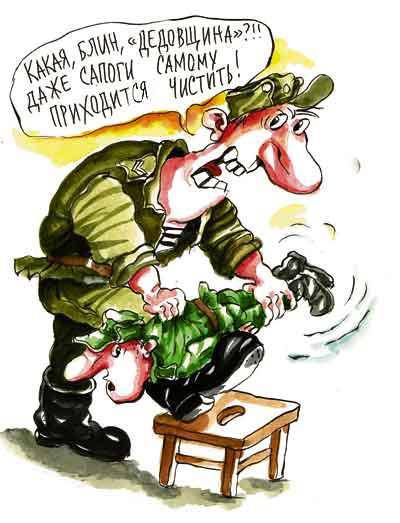Hazing to win - there would be a desire
1. Non-statutory relations flourish where there are no real and legitimate levers of power for sergeants and officers. It is said that hazing originated in the 60s of the last century. There is reason to agree with this. These were the last years when a sergeant was real in the army, not a formal commander. The sergeant could under the charter, i.e. according to the law, to punish his negligent subordinate, and the punishment was effective - fists were not required for this. With 60-x, the powers of commanders to apply and punishments and rewards gradually decreased. Gone in history legal methods of influencing offenders - guardhouse, work order, etc. The training of sergeants was not made in the regimental schools, but in special training units. After the end of the "training" such a sergeant arrived at the troops, but could not really command, because the old soldier was more experienced than the newly made sergeant. The real power in the division (in the absence of officers) passed to the “demobels”, who did not have statutory powers, were only non-statutory. It has gradually become a system. The blame for this is not a sergeant, but the top leadership of the armed forces.

2. Gradually, the junior officers lost power over the personnel; at best, they began to perform non-commissioned duties: to spend the night in the barracks (the so-called responsible system); cleaning of the territory - the senior officer is appointed (better major, if not higher) and other examples of mistrust and humiliation of officers. And the legal powers of disciplinary officers are less and less. The quality of conscripts is getting lower and lower, since all the smart and cunning conscripts "retreated", by entering the university, having fabricated the disease, simply not being in the draft board or other means. Those who turned out to be called up, dream of “procanting” until the end of the service. And what are the measures of influence for negligent soldiers (except for appealing to conscience and reason):
- a sentence, a severe reprimand - so from this neither ration, nor the monetary allowance will not decrease. They are so miserable;
- an order for service out of turn - and without this punishment "every other day for a belt";
- to avoid dismissal to the city - there are no such dismissals to the city at all, because there are no cities, or the senior military commander has banned all dismissals (collective punishment for one slogger).
So what should an officer do when there is a soldier in a barracks, and he is drunk as well. You will not hand over to the police, you will not send to the sobering-up center. "Pong" is in some cases the only measure of impact.
I have no doubt that there are decent officers, caring commanders, educators, and this is with their meager "salary" and household disorder. But how much can this decency be exploited, is it not time to create normal conditions for service and disciplinary practice?
3. It seems that only the top leadership of the army is concerned about the problem of non-statutory relations, and the rest - from the sergeant to the general hide the offense. And who created this vicious practice of evaluating the activities of commanders, if not top management. If the regiment commander independently identifies the perpetrators, he will punish the perpetrators by legal means (up to criminal responsibility), so they will “torture him” for this, torture him with commissions and checks. And the quality of educational work will be assessed by the quantity (cane system) of lawfully taken measures of influence - the more the commander worked, the worse for him. So who pushes for concealment as a non-existent system.
4. I am ashamed to look at the officers (including senior ones), who in quilted jackets, in untidy “camouflage” walk around the city like homeless people and workers of the most not prestigious specialties. Who brought them to this state? Yes, the guards of any more self-respecting organization look more attractive, deserve respect due to appearance. People shy away from the defenders of the Motherland in the bus, as if not messed up. Now military uniforms are available to everyone, and in the old days the right to wear military uniforms was not granted to all retired, but only to honored officers, as stated in the dismissal order - “with the right to wear military uniforms”. In the military form now go the poorest segments of society, where will prestige and pride in the defenders of the fatherland.
Information